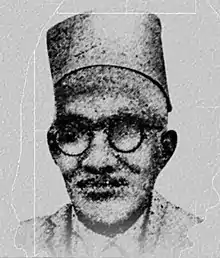K. Uppi Saheb
K. Uppi Saheb, or Kottal Uppi Saheb Bahadur, (1891–1972) was an Indian politician and social worker from Kannur, north Kerala.[1][2]
Kottal Uppi | |
|---|---|
 Kottal Uppi | |
| Personal details | |
| Born | 1891 Kottayam, Kuthuparamba |
| Died | 11 May, 1973 |
| Political party |
|
| Spouse(s) | Kayyumma |
| Parents |
|
| Education |
|
Kottal Uppi, from an elite Mappila family from north Malabar with a mercantile background, was educated at Tellicherry Brennen College and Mohammedans College, Madras. He was elected to the Madras Legislative Council from a Muslim seat in 1923. He was re-elected to the legislative council in 1926 (as a Congress member supported by the Swaraj Party). He is said to have maintained "tenuous and cautious" links with the Khilafat Movement at this time.[3] He was later elected to the Imperial Legislative Assembly from West Coast and Nilgiris, Muhammadan (1930).[3]
Along with K. M. Seethi Saheb, B. Pocker and M. Mohammed Ismail, Uppi Saheb was one of the principal leaders of All-India Muslim League in Madras Presidency from the mid-1930s.[1][2] After the partition of India in 1947, the All-India Muslim League was succeeded by Indian Union Muslim League (1951) in the new Dominion of India.[4][1]
He served as the Assembly Leader of the Muslim League (ML) in Madras Legislative Assembly.[1] He later ceased to be a Member of the Assembly on the re-organization of States.[5]
References
- Wright, Theodore P. (1966). "The Muslim League in South India since Independence". American Political Science Review. 60 (3): 579–599. doi:10.2307/1952972. ISSN 0003-0554. JSTOR 1952972.
- Wright, Theodore P. (1964). "Muslim Legislators in India". The Journal of Asian Studies. 23 (2): 253–267. doi:10.2307/2050136. ISSN 0021-9118. JSTOR 2050136.
- McPherson, Kenneth (2010). A Modern Political History of the Tamil Muslims. New Delhi: Routledge. pp. 137, 142-43 and 166. ISBN 978-1-136-19834-2.
- "Explained: History of Muslim League in Kerala and India". The Indian Express. 2019-04-06. Retrieved 2019-08-04.
- "Madras Legislative Assembly (1952-1957)" (PDF).